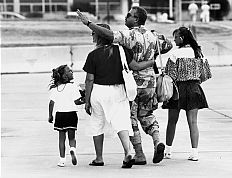 |
 |
 |
 |
|
|
|
Sweet homecoming
More than four months after the Persian Gulf War ended, Staff Sgt. Thurlow Vorhees leaves Fort Wayne International Airport (then called Baer Field) with his family, from left, daughter Dominque, wife Christine and daughter Danyelle. His unit had been in the gulf for more than five months. |
|
|